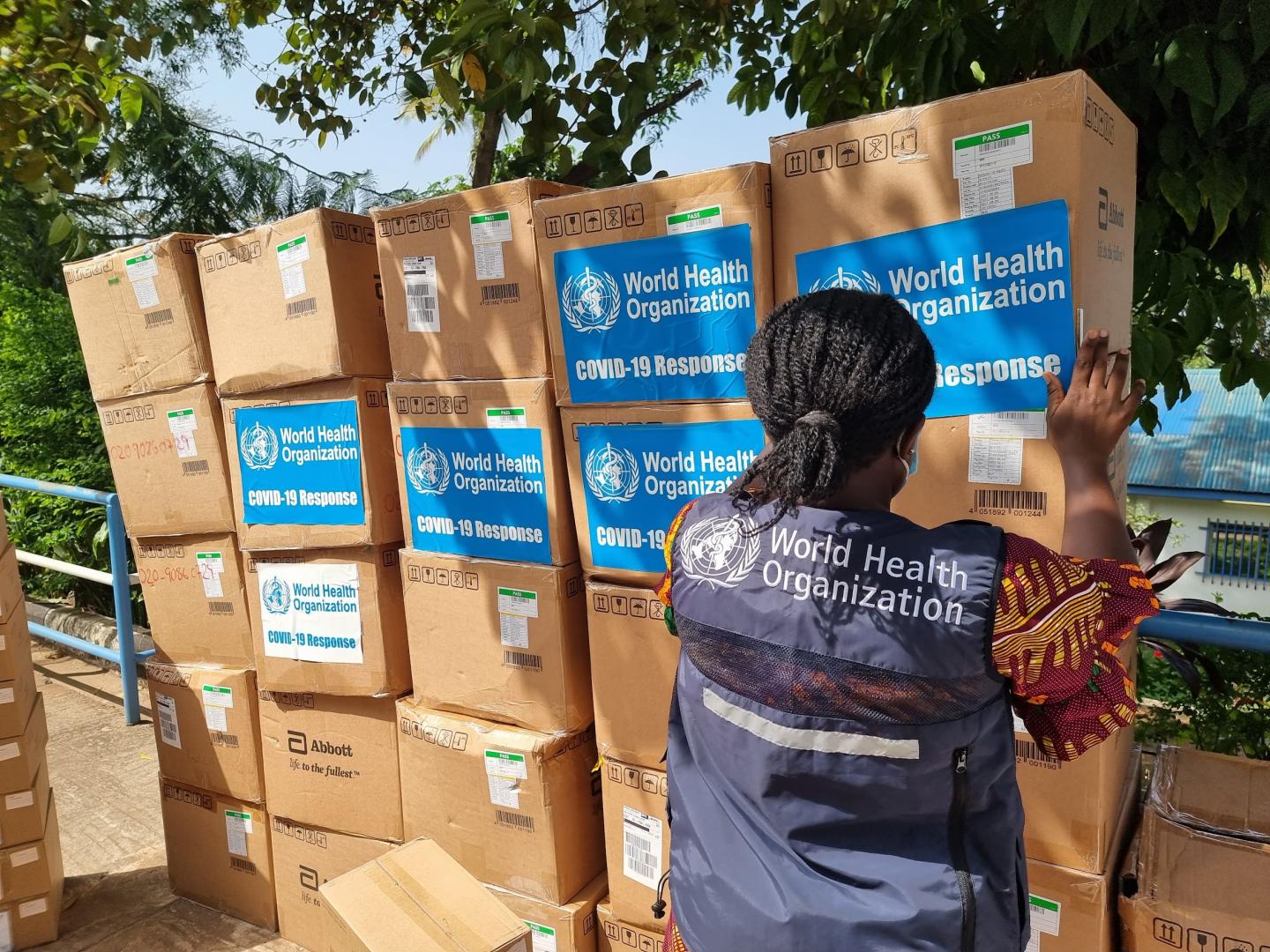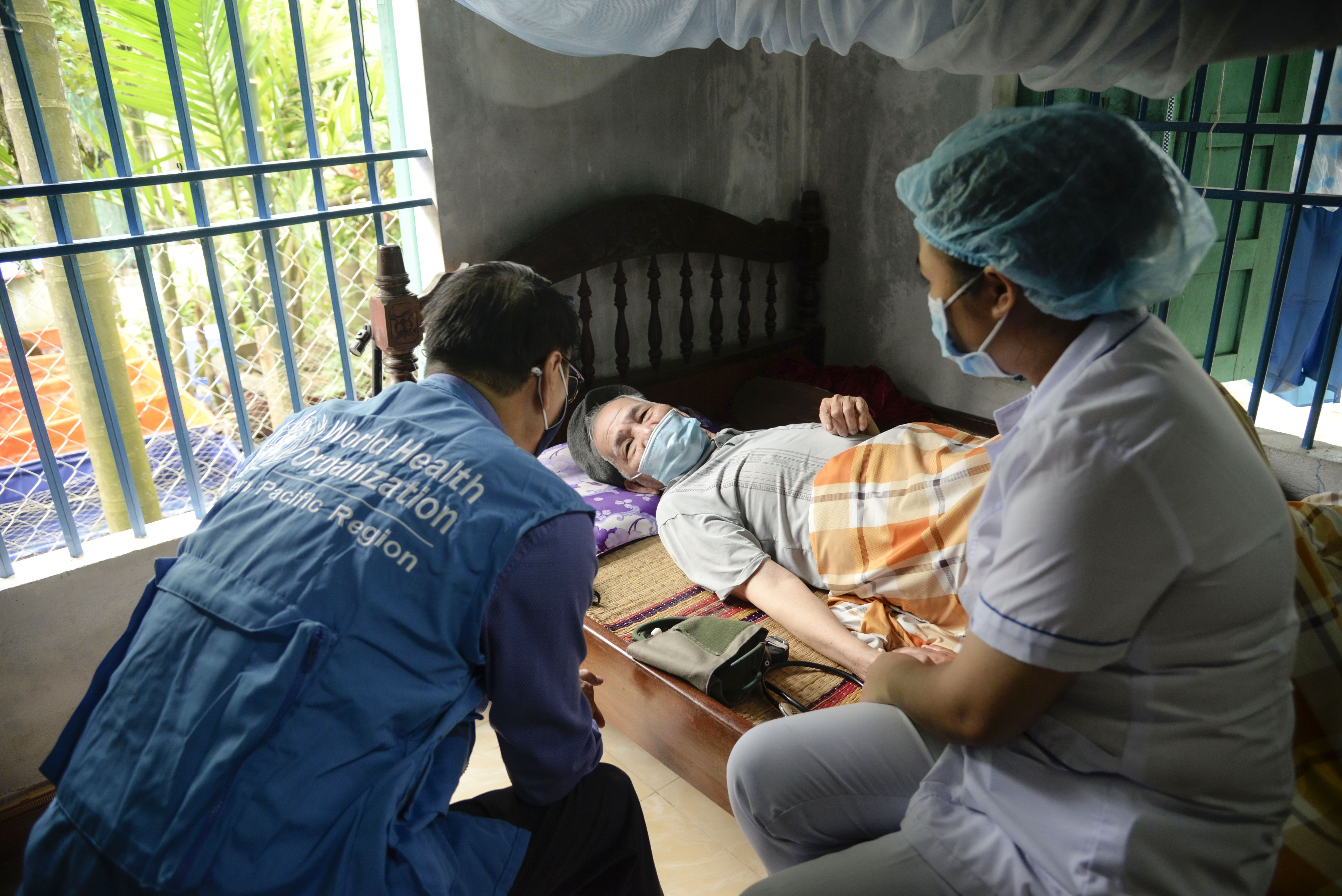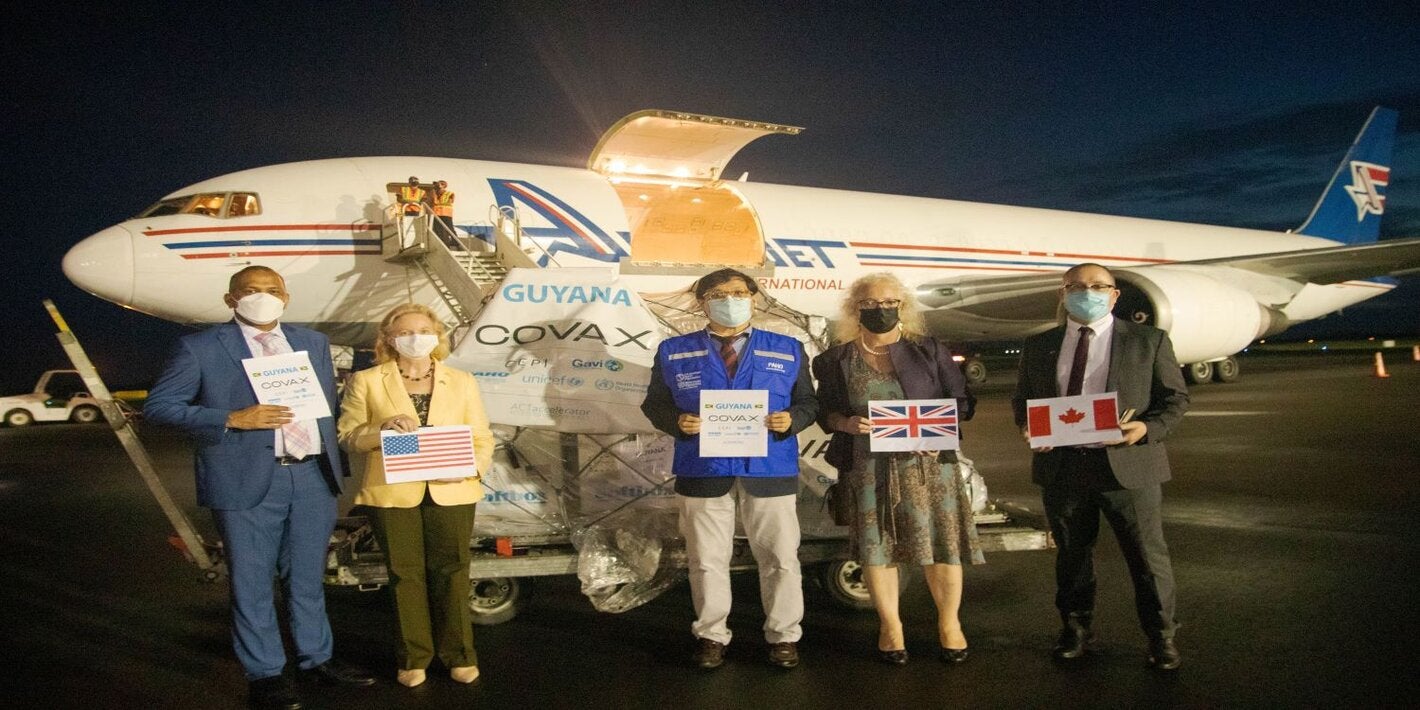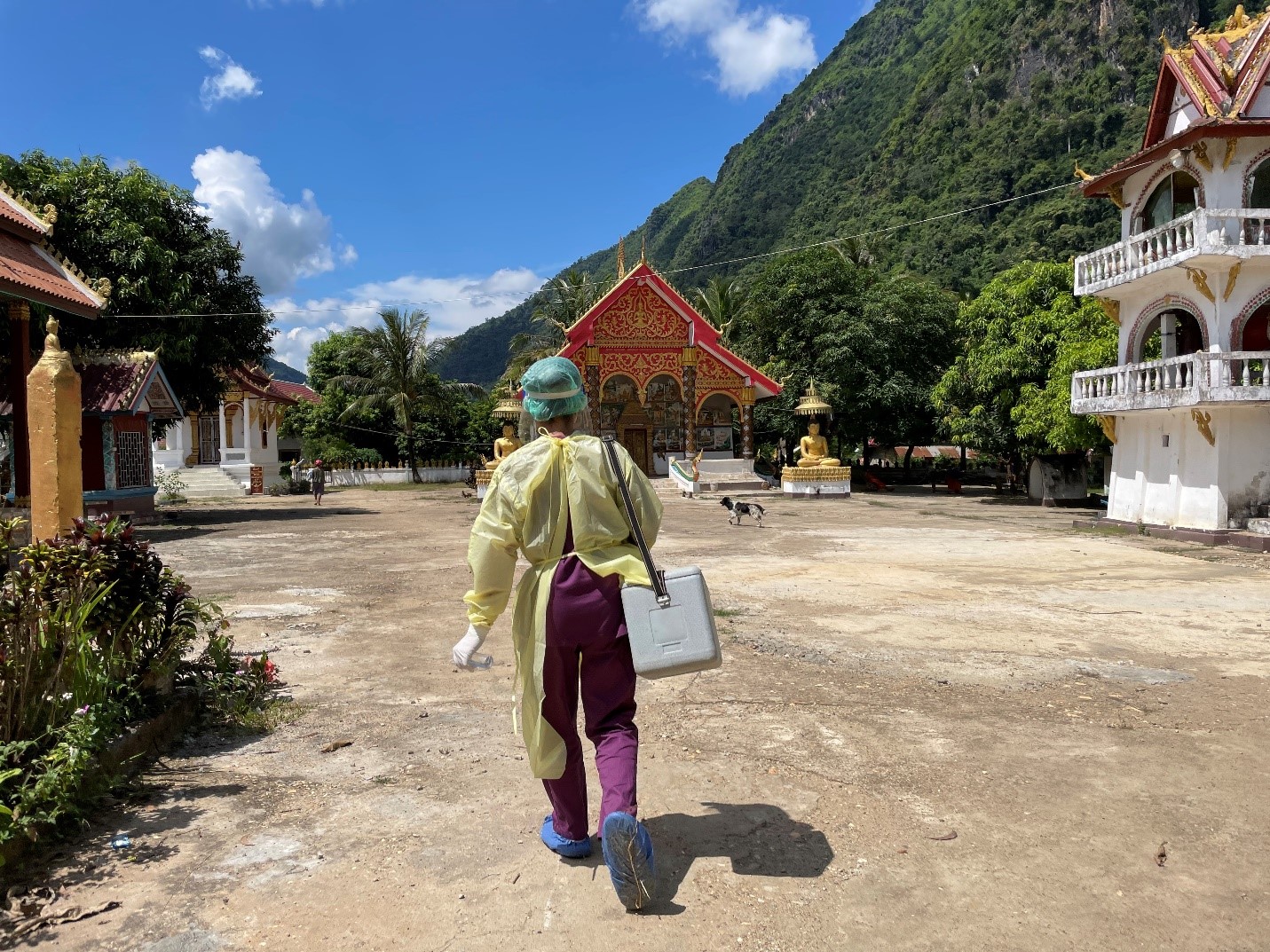Over the past few weeks, contributions to WHO have helped acquire and deliver lab supplies in Sierra Leone, COVID-19 test kits in Uganda, vaccines in Guyana, and intravenous fluids to fill a shortage in the Islamic Republic of Iran.
The funds have enabled vaccination campaigns in remote villages in Viet Nam and the Lao People’s Democratic Republic, aided Sri Lanka in building a vaccination-tracking system, and provided support for Yemen’s weakened health system amid civil war and pandemic.
Read on for the details.
Sierra Leone receives laboratory commodities to track and respond to COVID-19
 Donations of lab commodities arrive in Sierra Leone. ©WHO/S. Gborie
Donations of lab commodities arrive in Sierra Leone. ©WHO/S. Gborie
Sierra Leone will be able to scale up COVID-19 testing at 20 high-burden health facilities thanks to a shipment of donated laboratory supplies. The shipment included US$ 600 000 in essentials such as specimen collection kits and tests that screen for COVID-19 variants of concern.
In rural Viet Nam, mobile vaccination teams reach the elderly
Hundreds of elderly people in Quang Nam province are getting their COVID-19 vaccinations at special centers. Those who are unable to get to the centers are receiving their shots at home, courtesy of mobile teams.
 A mobile vaccination team visits those who can't make it to the centre. ©WHO/Loan Tran
An
A mobile vaccination team visits those who can't make it to the centre. ©WHO/Loan Tran
An
 In-home vaccination in Quang Nam province, Viet Nam ©WHO/Loan Tran An
In-home vaccination in Quang Nam province, Viet Nam ©WHO/Loan Tran An
Guyana’s vaccination program strives toward global goals with latest COVAX shipment
More than 42 000 doses of vaccine landed at Guyana’s main airport on 6 December, headed for the country’s national vaccination program. Guyana is making a special effort to reach pregnant women because infections appear to be trending in that group, health officials say. As of mid-December, more than 36% of the population was fully vaccinated, and more than half the population had received at least one dose.
 Donors and Guyanese officials greet a new shipment of vaccines
Donors and Guyanese officials greet a new shipment of vaccines
Uganda welcomes test kits that can identify COVID-19 variants of concern
WHO has provided the Uganda Virus Research Institute with 3360 test kits to identify and prevent variants of concern.
“These kits offer a triple benefit in preventing and limiting the spread of Omicron and other variants of concern,” said Dr Yonas Tegegn Woldemariam, WHO Representative in Uganda. “They will allow rapid identification of the highly transmissible Delta variant, screen for Omicron, and help in prioritizing specimens for genomic sequencing.”
 COVID-19 vaccination in Uganda
COVID-19 vaccination in Uganda
WHO donates 260 000 packs of intravenous solutions to the Islamic Republic of Iran
Extra pressure on the country’s health system from COVID-19 caused a shortage this autumn in intravenous solutions for patients. The shipment, worth US$ 156 000, arrived in the country on 6 December. It will also be used to help Afghan refugees.
 In a warehouse in Tehran, a WHO team member checks on a shipment of IV solutions. ©WHO
In a warehouse in Tehran, a WHO team member checks on a shipment of IV solutions. ©WHO
Vaccination teams fan out in hard-to-reach areas of the Lao People’s Democratic Republic
A far-flung district of mountain hamlets became the focus of a vaccination campaign this autumn after a cluster of more than 100 cases of COVID-19 was discovered there. Over 12 days, outreach teams administered more than 6500 doses of vaccines.
 A health worker goes door to door with her vaccination kit in Ngoi district. ©WHO/Souliya Channavong
A health worker goes door to door with her vaccination kit in Ngoi district. ©WHO/Souliya Channavong
 Newly vaccinated in Ngoi district. ©WHO/Souliya Channavong
Newly vaccinated in Ngoi district. ©WHO/Souliya Channavong
Sri Lanka shares its new vaccination-tracking system
Sri Lanka is using its new COVID-19 Immunization Tracker to capture and analyze data, such as gender, age, location and type of vaccine, for the country’s vaccination programme. Sri Lanka designed the tracker based on guidance from WHO and is sharing it with neighbors including Timor-Leste.
 Sri Lanka has better-organized data for its vaccination program after designing the COVID-19 immunization tracker. ©UNICEF Sri Lanka
Sri Lanka has better-organized data for its vaccination program after designing the COVID-19 immunization tracker. ©UNICEF Sri Lanka
WHO donations support health systems in Yemen
 Lawdar Hospital, Yemen
Lawdar Hospital, Yemen
WHO and partners are working in Yemen as the country struggles to care for patients amid a civil war and a pandemic.
“We are grateful for the continued dedication of WHO in such difficult circumstances,” said Dr Nabil Hussein, Director of Lawdar hospital. “The support we received has been substantial. The hospital has been equipped with machines, medical and non-medical supplies. The efforts also included support to our therapeutic feeding center and the COVID-19 isolation units. Not to mention the highly beneficial quality-care training that was offered to health staff in the hospital.”
* * *
Partners and donors recognized in this week’s feature include Canada, CEPI, Gavi, the Islamic Development Bank, King Salman Humanitarian Aid and Relief Centre, UNICEF, United Kingdom and USAID.
WHO thanks all governments, organizations and individuals that have contributed to the COVID-19 response, in particular those who have provided fully flexible contributions to ensure a comprehensive fight against the disease.
* * *
Member States and other governments in 2021:
Australia, Belgium, Canada, Comoros, Denmark, Egypt, France, Germany, Ireland, Isle of Man, Israel, Italy, Japan, Kingdom of Saudi Arabia, Kuwait, Lesotho, Malta, Mauritania, Monaco, Netherlands, New Zealand, Norway, Philippines, Portugal, Republic of Korea, Slovak Republic, Spain, Sweden, Switzerland, Thailand, United Kingdom, United States of America.
Other partners in 2021:
African Development Bank Group, African Reinsurance Corporation, Alma Jean Henry Charitable Trust, Ancash, Asian Development Bank, Bill and Melinda Gates Foundation (BMGF), Central American Bank for Economic Integration (BCIE), China Medical Board, COVID-19 Solidarity Response Fund, European Commission (ECHO, NEAR, DG-INTPA), Foundation for Innovative New Diagnostics (FIND), Fundacion MAPFRE, FYT, Gavi-The Vaccine Alliance, International Development Association (IDA), International Organization for Migration (IOM), Islamic Development Bank (IDB), King Salman Humanitarian Aid and Relief Center (KSRelief), Kuwait Fund for Development, National Philanthropic Trust (NPT), Rockefeller Foundation, Secretariat of the Pacific Community, Sony, Susan Thompson Buffett Foundation, Task Force for Global Health (TFGH), The UN Resident Coordinator Office (UNRCO), International Drug Purchasing Facility (UNITAID), United Nations Central Emergency Response Fund (CERF), United Nations Children's Fund (UNICEF), United Nations Development Programme (UNDP) and the Multi-Partner Trust Fund (MPTF), United Nations High Commissioner for Refugees (UNHCR), United Nations Multidimensional Integrated Stabilization Mission in Mali, United Nations Office for South-South Cooperation (UNOSSC), United Nations Office for the Coordination of Humanitarian Affairs (UNOCHA), United Nations Population Fund (UNFPA), United Nations Postal Administration (UNPA), United Nations World Food Programme (WFP), Veolia Environment Foundation, Vital Strategies, WHO Foundation, World Bank.
Read more about donors and partners contributing to the COVID-19 response
You can donate today
